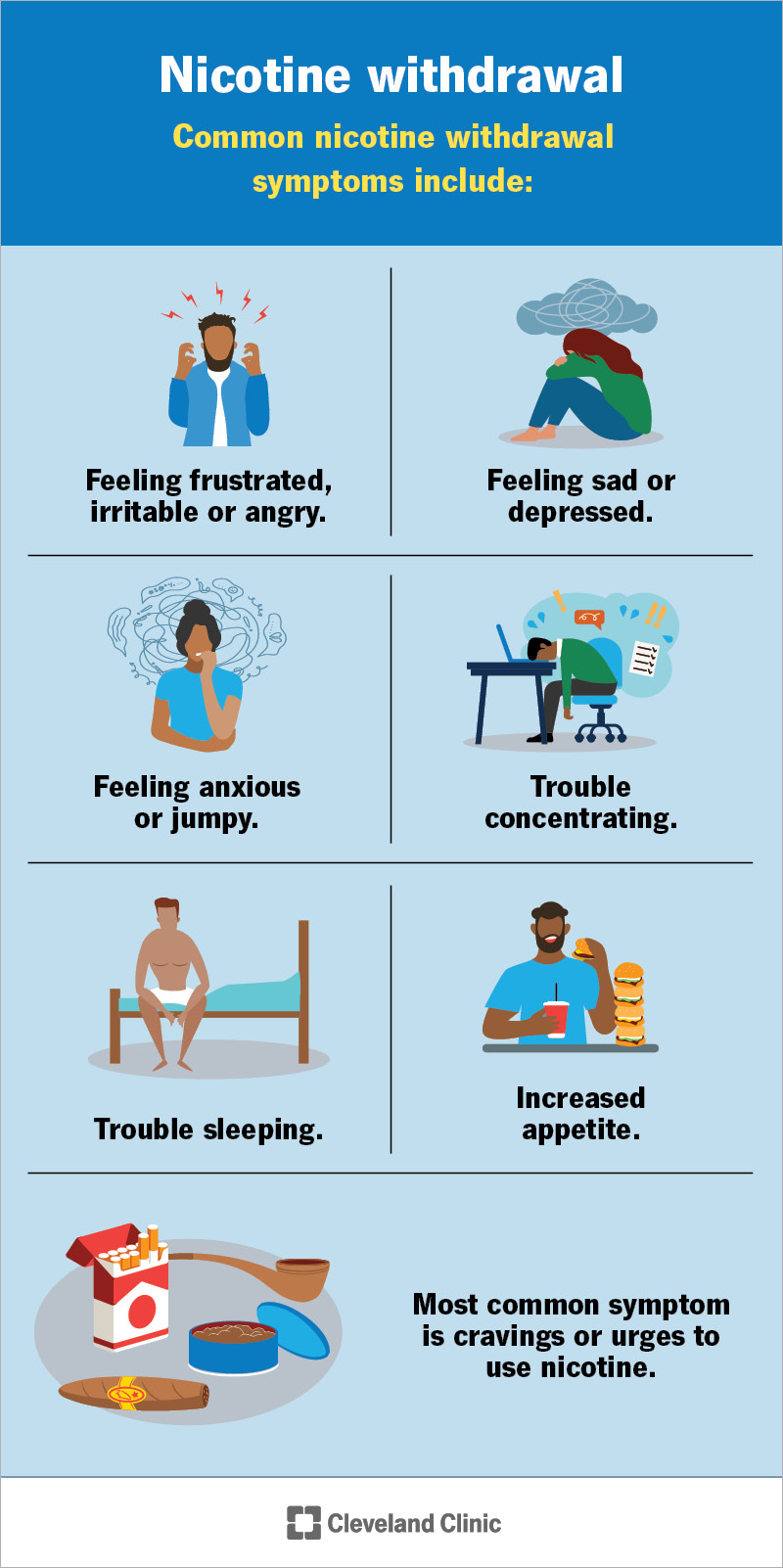Nicotine withdrawal is the physical and psychological symptoms you feel when you stop or reduce the use of nicotine. Common symptoms include cravings, irritability, insomnia and trouble concentrating. Several strategies can help combat the physical, mental and emotional symptoms of nicotine withdrawal.
Advertisement
Cleveland Clinic is a non-profit academic medical center. Advertising on our site helps support our mission. We do not endorse non-Cleveland Clinic products or services. Policy
Nicotine withdrawal is the collection of physical, mental and emotional symptoms you feel as nicotine leaves your body. It happens if you have nicotine dependence and stop using or reduce the substance.
Advertisement
Cleveland Clinic is a non-profit academic medical center. Advertising on our site helps support our mission. We do not endorse non-Cleveland Clinic products or services. Policy
When you use tobacco products, your body and brain become used to nicotine. It’s a highly addictive substance. When you cut back or quit using nicotine-containing products, the lack of nicotine in your body can cause uncomfortable symptoms. But nicotine withdrawal isn’t harmful to your health. It fades over time as long as you stay nicotine-free.
Tobacco products that contain nicotine include:

Image content: This image is available to view online.
View image online (https://my.clevelandclinic.org/-/scassets/images/org/health/articles/21587-nicotine-withdrawal)
Common nicotine withdrawal symptoms include:
Less common nicotine withdrawal symptoms include:
Nicotine withdrawal symptoms vary from person to person. The severity of your symptoms depends on:
The timing and intensity of nicotine withdrawal varies for each person. But in general, the nicotine withdrawal timeline goes as follows:
Advertisement
Can nicotine withdrawal make you sick?
Some nicotine withdrawal symptoms may make you feel like you’re sick, including:
These symptoms happen because of a lack of nicotine in your body, not because you caught a viral or bacterial infection. It’s possible, though, to have an infection (illness) and go through nicotine withdrawal at the same time.
Nicotine binds to certain receptors in your brain. It causes your brain to release dopamine, a neurotransmitter (chemical messenger). Dopamine is the “feel-good” neurotransmitter.
As long as you continue to use nicotine-containing products, your brain continues to release dopamine. When you don’t smoke or use nicotine-containing products, nicotine no longer stimulates your brain’s receptors. Your brain releases less dopamine. And your pleasure center, which affects your mood and behavior, begins to change. This causes some of the withdrawal symptoms.
Nicotine also changes the balance of other neurotransmitters in your brain. Stopping the use of nicotine disrupts the chemical balance, causing some of the other withdrawal symptoms.
Nicotine withdrawal can feel all-encompassing. It affects how you feel physically, mentally and emotionally. Quitting nicotine products is always a good idea — no matter the timing. But having a plan for facing withdrawal symptoms before you stop nicotine may increase your odds of quitting for good.
Consider seeking out a smoking or tobacco cessation (quitting) program. There are several types, and they have many resources to help you through the process. If you don’t know where to start, reach out to your healthcare provider for help.
In general, you’ll likely need to use several strategies to combat the cravings, physical symptoms and mental symptoms of nicotine withdrawal.
Nicotine replacement therapy (NRT) involves using products containing low doses of nicotine — like gum and skin patches — to cut down on cravings and lessen withdrawal symptoms after you quit smoking. It’s a type of medication-assisted treatment (MAT).
NRT can help with physical withdrawal and craving symptoms. But it doesn’t address all the components of quitting smoking, like the mental, emotional and social aspects.
Advertisement
Your healthcare provider may also recommend taking one of two prescription medications (pills) for quitting smoking alongside NRT: varenicline or bupropion. They don’t contain nicotine.
Some strategies you can try to curb physical withdrawal symptoms include:
Strategies for managing the mental, emotional and habitual aspects of quitting nicotine use include:
Advertisement
Experiencing nicotine withdrawal is the toughest part of quitting smoking or other nicotine products. The first week after quitting is when you’re the most at risk of slipping up and returning to using nicotine. It may take several tries to quit. This is very common. You’re not alone.
But quitting is possible. Ask your healthcare provider for help if you’re having a difficult time. They can provide smoking cessation aids and counseling to help you quit for good.
Unfortunately, everyone who’s been a regular user of nicotine experiences some degree of withdrawal when they quit.
Your healthcare provider can recommend over-the-counter or prescription products (nicotine replacement therapy) to ease your withdrawal symptoms. It may be a good idea to talk to your provider before you quit so you have a plan for addressing withdrawal symptoms.
Dealing with nicotine withdrawal symptoms isn’t easy. But know that you can do this. You can quit, and you move closer to quitting with each attempt. Nicotine withdrawal is a short-term experience. The long-term health benefits you’ll gain from quitting will be with you for the rest of your life. Know that your healthcare team is ready to help you.
Advertisement

Sign up for our Health Essentials emails for expert guidance on nutrition, fitness, sleep, skin care and more.
Learn more about the Health Library and our editorial process.
Cleveland Clinic’s health articles are based on evidence-backed information and review by medical professionals to ensure accuracy, reliability and up-to-date clinical standards.
Cleveland Clinic’s health articles are based on evidence-backed information and review by medical professionals to ensure accuracy, reliability and up-to-date clinical standards.
A substance use disorder can turn your life upside down. Cleveland Clinic has the hope and treatment you need.
